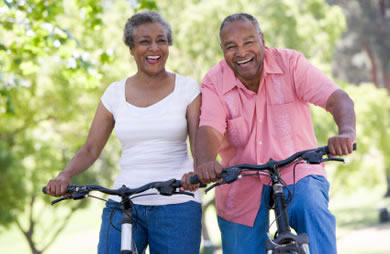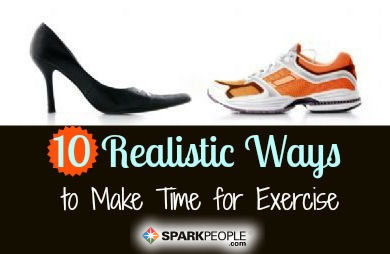|
As part of Eating Disorders Awareness Week, SparkPeople’s award-winning fitness expert, Nicole Nichols, is opening up about her own struggles with disordered eating. SparkPeople’s fitness expert "Coach Nicole" is passionate about changing the image of “fit and healthy.” Named America's Top Personal Trainer to Watch by the American Council on Exercise and Life Fitness in 2011, Nicole soon after celebrated the launch of her newest DVD, 28-Day Boot Camp. In addition to teaching Spinning and Pilates, she runs half-marathons, practices yoga weekly, and strength trains regularly. At 29, she’s proud to be a role model for those aspiring to take control of their health—without letting the scale and fitness take control of them. What sets Nicole apart from many other fitness experts is her "real life, real people" attitude. She believes that the images we see every day of models, actors and personal trainers set an unattainable standard, one that she hopes she and her DVDs are changing. Nicole is the happiest and healthiest she’s ever been, but she’s quick to say she’s not at her thinnest—and that’s just fine by her. Thin is not a synonym for healthy, she says, and skinny is not the same as strong. In college, she wasn’t yet convinced. Nicole spent hours in the gym and maintained a strict diet, as a way to emulate the models and trainers she saw in the media. Nicole was chiseled, but she was also suffering from an eating disorder. Nicole recovered, and since then, she has focused on making fitness more about how she feels inside and performs as an athlete rather than what size pants she wears. Recently, I asked Nicole to share her views on how to set healthy goals for your body and whether personal training is changing for the better, as a way to draw attention to National Eating Disorder Awareness Week. Do you think most people set unrealistic standards for themselves when they start to work out and try to lose weight? I think we compare ourselves too much to other people. We want our bodies to look like someone else's, whether that's realistic or not. It sets us up for failure. Rather than aspiring to attain someone else's physique, focus on your own strengths and what's healthy and realistic for you. I spent a long time trying to look like the thin, toned, "tiny" bodies that I saw in magazines. I got there—I dropped body fat, gained muscle, and got compliments left and right on how great I looked. But as it turned out, I actually had an eating disorder. Trying to mold my body into something that it wasn't was unhealthy, unrealistic and unsustainable. It took hours of exercise every day and a restrictive diet that gave me no pleasure from food and left me constantly hungry. Since then I've recovered, returned to a normal, healthy, natural size for my body and regained a healthy relationship with fitness, food, and the scale. What type of standard for physique do you advocate to the people you teach? I don't advocate any type of physique. In fact, I try not to talk much about burning calories, trimming inches or how any particular exercise may change one's body. I believe people can be fit and healthy at any size. I also think it's healthier for our self-esteem, for our minds and bodies to view exercise not as a way to "change" ourselves, but as a tool to improve our overall health. It can be motivating to aim for a healthy weight at a safe pace. But regardless of what the scale says or how your body is shaped, if you are exercising, you are doing a lot of good for your body. How do people react to that message? People who follow my videos and blogs really seem to love and embrace this view of exercise. They are everyday people (just like I am) who are trying to have a life but still be healthy—without spending hours exercising or living in the gym. They realize that small amounts of fitness add up and that fitness is about feeling good—not just looking good. You teach on the topics of body image and self-acceptance. Beyond telling people to set realistic goals, what are the other themes you touch on? I try to spread a message of loving your body enough to take care of it and treat it with respect. Respect isn't torturing your body or starving yourself or punishing yourself in the gym. Respect comes from moderation in food, enjoying your food, being realistic in what you expect your body to achieve or look like, and exercising a healthy amount without going overboard. Does it matter what your personal trainer looks like? You can't judge a trainer's experience, expertise, effectiveness or motivational power by their body alone. Not every person can achieve an ultra-ripped or very toned or thin physique we imagine an ideal trainer should have—and how a person's body looks isn't necessarily a reflection of how strong, fit or healthy they really are. In addition, many people who have that "ideal" physique are doing a lot of unhealthy things to reach and achieve it. Many trainers I know subscribe to way-too-intense fitness regimens and super-restrictive diets that border on eating and exercise disorders in order to look the way they do, so it's not necessarily something to emulate. In fact, having a trainer who looks more like you—and less like an ideal—is often more motivating. Studies have shown that seeing ripped trainers and models in magazines and on workout videos often discouraged and de-motivated people trying to get in shape. Is the standard for what a personal trainer needs to look like changing? I take the fact that I was honored by the American Council on Exercise (ACE) and Life Fitness as sign that our industry is evolving by making room for trainers (like me) who don't have a "perfect" or ripped physique, but can still serve as healthy role models and help others achieve fitness at any size. And it's making room for a less intimidating and more nurturing and encouraging style than what has been the norm, which is essential when most of America is overweight and out of shape, In my new DVD SparkPeople: 28 Day Boot Camp, I specifically casted trainers who had healthy, realistic bodies that would make everyone exercising with us at home feel right in place. I think there are signs of gradual shift in that direction across the industry, and I think it's a step in the right direction for healthy living. Are you more motivated by seeing a ripped personal trainer or one with a more attainable physique? Have you ever suffered from an eating disorder? How did you overcome it? |
Popular EntriesMore From SparkPeople
|









.jpg)









